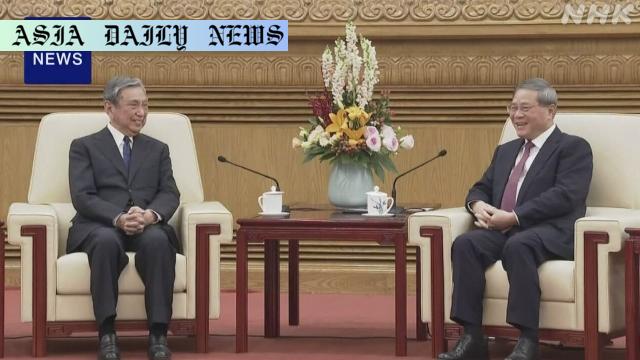Trade Relations: Chinese Premier Li Qiang seeks stable ties with Japan amid growing trade tensions with the United States.
Chinese Premier Li Qiang emphasizes the importance of stable ties with Japan.
Li critiques US tariff policies as a global challenge.
Japan-China relations identified as entering a ‘special period’ of improvement.
Kono Yohei proposes replacing pandas returning from China.
Li acknowledges deepening Japan-China cooperation as a strategic necessity.

China and Japan: Navigating a Special Period
On the global stage of geopolitics and economics, the delicate balancing act between superpowers often necessitates fostering deeper bilateral partnerships. During a pivotal meeting held in Beijing, Chinese Premier Li Qiang expressed his aspiration to fortify ties with Japan amidst the backdrop of heightened trade tensions created by US tariffs. Speaking with Japan’s Association for the Promotion of International Trade, led by former Japanese Lower House Speaker Kono Yohei, Premier Li referred to the evolving nature of China-Japan relations as a “special period.” This term underscores the recognition of the potential challenges and opportunities both nations face in recalibrating their economic dynamics.
Global Context: A Challenge Posed by US Tariff Policies
Premier Li highlighted the far-reaching ripple effects of US tariff policies under the current administration, describing them as a challenge not solely confined to the two superpowers but affecting countries on a global scale. These measures have created significant hurdles in international commerce, compelling countries like China and Japan to reassess their strategies, foster mutual partnerships, and devise innovative pathways to secure economic growth. By highlighting this shared challenge, Premier Li positioned China and Japan as natural allies in addressing global trade inequalities.
Strengthening Collaborative Opportunities
In fostering these alliances, cultural symbols can occasionally take center stage. Kono Yohei presented an unorthodox yet lighthearted concern: the return of four giant pandas from a Japanese theme park to China. Highlighting the cultural and emotional connections these pandas represented, Kono suggested that bringing in new pandas could symbolize goodwill and rejuvenated ties. Premier Li responded with a smile and recognized the proposal as “an important suggestion,” reflecting diplomatic tact and an understanding of the weight of cultural diplomacy.
Deepening Regional Ties Amid Economic Challenges
Trade and economic collaboration remain cornerstones of China-Japan relations. Both nations shoulder immense responsibilities amidst shifting global dynamics. Premier Li reiterated the necessity of deeper cooperation to address shared concerns while navigating economic turbulence. By solidifying regional partnerships, China and Japan could explore resilient economic models, boost interdependency, and reduce vulnerabilities imposed by external pressures such as fluctuating tariffs.
Looking Ahead: Prospects for Stability and Growth
As China and Japan embark on what Premier Li has identified as a “special period,” their focus on mutual respect and collaboration promises significant potential for economic stability. The intertwining of cultural diplomacy, like the panda exchange, with strategic trade collaboration reflects the multidimensional nature of their relationship. Moving forward, the two Asian giants must focus on fostering goodwill, promoting innovation, and addressing shared economic concerns to withstand external challenges and contribute to a stable, prosperous global economy.



Commentary
The Intricacies of Global Trade Relations
Reflecting on the interactions between Chinese Premier Li Qiang and the Japanese delegation, the nuances of geopolitical and economic dynamics become increasingly apparent. Trade relations, after all, are rarely confined to mere numbers—they encompass cultural exchanges, shared strategies, and mutual objectives. Premier Li’s emphasis on a “special period” of improvement aptly captures the current level of sensitivity and opportunity between China and Japan. Their ability to navigate this period collaboratively must involve pragmatic decisions as well as a shared vision.
Cultural Diplomacy: More Than a Symbolic Gesture
Mr. Kono’s comment on the return of pandas might seem trivial on the surface, but it underscores a critical aspect of international diplomacy. Often, culturally significant symbols have bridged gaps where economic or political negotiations faltered. By proposing to renew this gesture, Kono highlighted the significance of cultural goodwill in deepening international ties. Premier Li’s considered response provides insight into China’s thoughtful approach to acknowledging even unconventional aspects of diplomacy.
Facing Challenges Through Cooperation
The shadow of US trade tariffs looms large, not only in China but globally. Under this pressure, the importance of regional alliances has been magnified. By fostering a partnership with Japan, China demonstrates an understanding of its role as a leading global economic player while also highlighting the necessity for innovative solutions. These collaborations, however, must remain transparent and equitable, ensuring mutual benefits for both sides.
The Path Ahead: Opportunities and Commitments
As the global economy braces for potential upheavals, Japan-China relations serve as a perfect example of the transformative potential of well-executed cooperation. The leadership exhibited by both Premier Li and figures like Kono provides a foundation for nurturing growth while tackling adversity. It is essential for both nations to prioritize their shared goals over external pressures, setting a positive example for other regional and global partnerships.